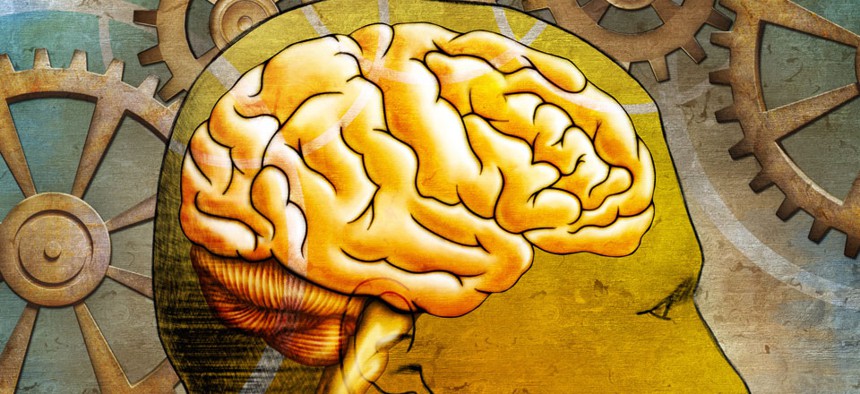
Andrea Danti/Shutterstock.com
The Scant Science Behind Anything That Claims to Boost Your Brainpower
Researchers have yet to find conclusive evidence that brain training works.
To hear the advertisers of the various brain training apps tell it, there’s no longer an excuse for intellectual mediocrity. A slew of programs are available to boost your problem solving skills, attention, speed of thought, cognitive flexibility, and memory; Lumosity, the best-known app of the bunch, touts them all. What’s a payment of $14.95 per month (Lumosity’s extended version) in return for unlocking your cognitive potential?
The prospect of honing your mental acuity aside, scientists have yet to find conclusive evidence that brain training works. Research of novel concepts such as brain training is invariably fraught with problems, including failures to control for unconscious researcher biases that can lead investigations astray, placebo effects of otherwise inert treatments, and unsupported claims that performance on a smartphone game will generalize to sharper thinking. Promising results abound, but their validity quickly comes into question upon closer scrutiny. Put simply, scientific investigations all-too-frequently suffer from slipshod design, rendering their findings moot. That’s not to say that brain training doesn’t work—it merely confirms that good science is hard to do, and that we lack the needed quantity of grade A research to definitively judge if it does.
Last week, Shoba Narayan suggested that ancient spiritual practices such as tai chi, yoga, meditation, prayer, and chanting may be superior to brain training apps, because they “change the brain from the inside out—through acceptance, gratitude, and equanimity.” Indeed, Narayan claims that chanting mantras has helped shore up her heretofore-unreliable memory in a way that smartphone games never could.
Mantra meditation has deep roots in Hindu, Buddhist, and Sikh cultures, but in the West, a single tradition all but dominates the practice. The method arrived on American shores in 1959, when Mahesh Prasad Varma alighted in Honolulu. Varma, who would come to be known as the Maharishi, devised a method of mantra chanting called transcendental meditation, which thoroughly resonated with the 1960s counter-culture movement. The trademarked technique consists of a twice-daily mantra-chanting and relaxation ritual, and is suggested to be a bulwark against stress and unhappiness. The Beatles, who came across the Maharishi in 1967, were fast converts. Today, celebrities such as Sting, Susan Sarandon, Howard Stern, Ellen DeGeneres, and Jerry Seinfeld are all ardent transcendental meditation practitioners. David Lynch went so far as to establish a foundation to promote its teachings. According to its devotees, transcendental meditation is not simply a panacea for the individual— alleviating stress, and by extension, heart disease — but also heals on a larger, societal level.
Despite millions of dollars in grants and hundreds of published papers, the benefits of transcendental meditation appear to be outpaced by its claims. In January, an article titled “Meditation programs for psychological stress and well-being: A systematic review and meta-analysis“ appeared in JAMA Internal Medicine, an esteemed academic journal. The team of researchers, led by Madhav Goyal of Johns Hopkins University, examined over eighteen thousand studies that assessed the effects of various types of meditation. Aggregating the results of the 47 studies that met the researchers’ methodological requirements, they measured meditation impact on a litany of stress-related criteria: anxiety, depression, stress and distress, positive mood, mental health-related quality of life, attention, substance use, eating habits, sleep, pain, and weight. Mantra-based programs showed no benefits over and above placebos.
Does that mean that meditation doesn’t work? Not necessarily. Placebo effects are both real and beneficial, and the relaxation that stems from chanting mantras may be therapeutic in and of itself. Furthermore, mindfulness meditation—a variant that stems from the Buddhist tradition and involves fostering a nonjudgmental awareness of the present moment—was found by Goyal’s group to decrease anxiety and depression. And what of the cognitive improvements? Although mounting evidence suggests that mindfulness boosts traits such as working memory, there is a dearth of methodologically stringent research to support such conclusions for mantra chanting.
When modern medicine fails to satisfy, many of us tend to look to India and China. It is precisely the otherworldly spiritualism that seems to shroud so many ancient spiritual traditions that compels us to believe their assertions. Many of these persist because history has been loath to correct the nebulous claims of spiritual practices. Whether the flurry of brain training apps that have emerged in recent years may lead to cognitive improvements has yet to be confirmed; an eastward turn may help, but the practices we find there face similar evidential issues. In the meantime, relax, and explore your options.
Reprinted with permission from Quartz. The original story can be found here.
(Image via Andrea Danti/Shutterstock.com)
NEXT STORY: Want to Work in Science? Men Have the Advantage






